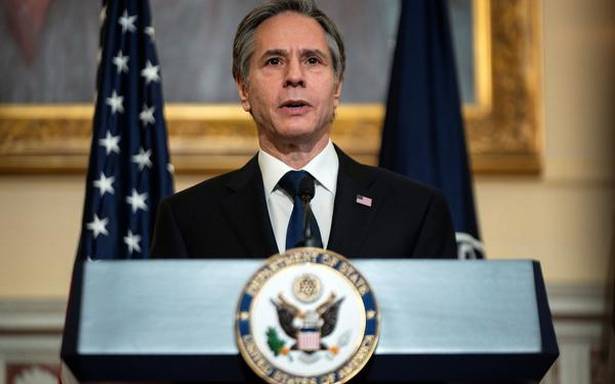“I don’t want to prejudge the outcome of that review,” Antony Blinken told members of the House Foreign Affairs Committee during a Congressional hearing on Wednesday
The Biden administration is currently reviewing its Afghanistan policy and has so far not made any decision on the American force posture in the war-torn country, Secretary of State Antony Blinken has said, ahead of the May 1 deadline for a final withdrawal of U.S. troops — stipulated in a Taliban-U.S. deal last year.
The Biden administration has decided to review the Doha deal the Trump administration had signed with the Taliban in February 2020. The deal provided for the withdrawal of American troops from Afghanistan, effectively drawing curtains to Washington’s 18-year war in the country. The U.S. has lost over 2,400 soldiers in Afghanistan since late 2001.
“I don’t want to prejudge the outcome of that review,” Mr. Blinken told members of the House Foreign Affairs Committee during a Congressional hearing on Wednesday.
“There haven’t been any decisions made yet on force posture when it comes to May 1 but as we are doing the review we are also pressing ahead with the diplomatic effort to try to drive the two parties to negotiate and to put in place agreements that would be the foundation for a just and durable peace in Afghanistan,” Mr. Blinken said.
“That of course is a very tall order but one that we are working on and especially enlisting others into the effort because as we were discussing a little bit earlier neighbouring countries have a huge stake in Afghanistan not being a terrain for civil war that spills over the borders and they have influence with various parties,” he said in response to a question.
“So we are engaging them, we are engaging the U.N. and others to try to move the parties to a meaningful negotiation even as we are looking very hard at the obligations the Taliban has made in the agreement that you reference particularly with regard to not supporting terrorist groups that could strike the U.S. and reducing violence,” he said.
U.S. special envoy for Afghanistan Zalmay Khalilzad spoke to External Affairs Minister S. Jaishankar on Sunday and they discussed the latest developments pertaining to the Afghan peace talks.
India, a major stakeholder in Afghanistan, has been keenly following the evolving political situation after the U.S. signed a peace deal with the Taliban.
India has extended developmental assistance to tune of around $3 billion in the last few years to Afghanistan.
The U.S., Mr. Blinken said, has boosted diplomatic efforts in Afghanistan, ahead of the May 1 deadline for a final withdrawal of U.S. troops. “The President’s goal is very clear,” he said.
“It’s to bring our troops home. And it’s to ensure that Afghanistan does not become a haven for terrorism and an ongoing threat to the United States,” he said.
“We are engaged in a diplomatic effort right now to try to drive the two parties to negotiate and to move forward on commitments that the Taliban made to the U.S. a year ago to negotiate meaningfully on a peaceful future for Afghanistan. Not only are we doing that, as important, we’re enlisting other countries, the United Nations, in that effort. Many of Afghanistan’s neighbours have a real stake in its future and influence with the parties,” Mr. Blinken said.
While the diplomatic effort is ongoing, the U.S. is reviewing its own troop posture, including the May 1 deadline, he said.
“We haven’t made any decisions yet about that, and we went to see where this effort goes to actually get the parties to engage in a meaningful way. The Taliban made other commitments when it comes to reducing violence, when it comes to non-harbouring or supporting terrorists. We want to see them make good on those obligations,” Mr. Blinken said.
The Biden administration on Tuesday said the U.S. is working closely with Afghan parties to encourage progress on a political settlement and a comprehensive ceasefire, asserting that any durable outcome has to be Afghan-led and Afghan-owned, and it is not for the U.S. to dictate the deals.
Source: Read Full Article

